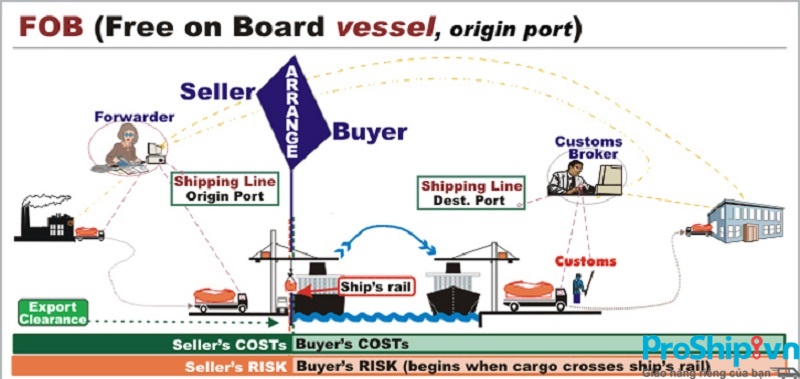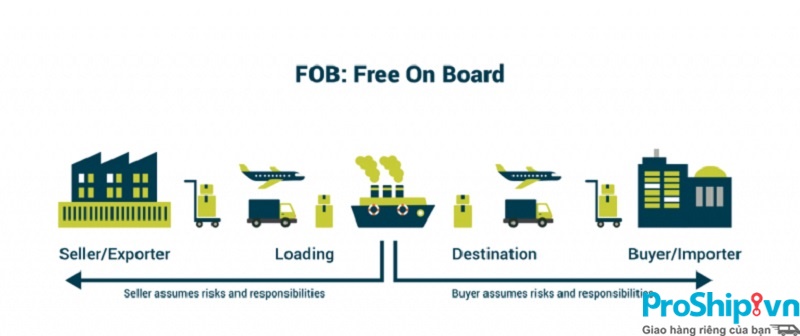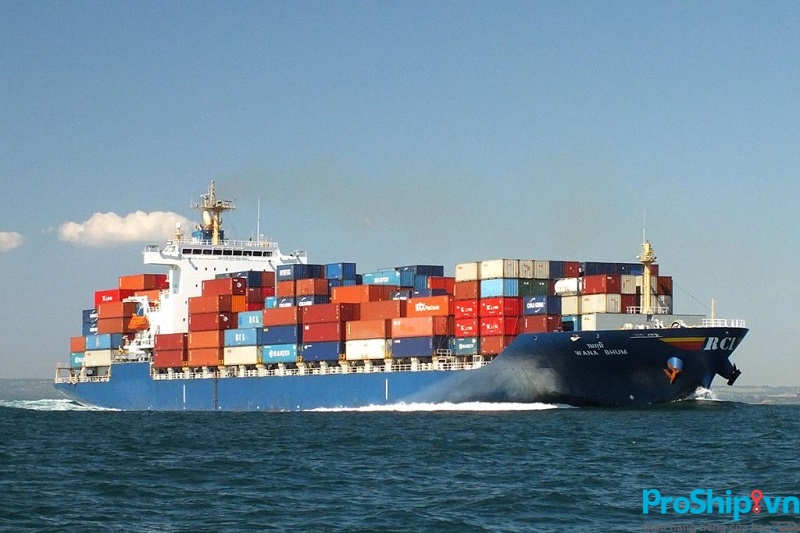* Bạn mơ hồ về khái niệm điều kiện FOB là gì? Có vai trò gì trong giao nhận hàng hóa?
* Bạn muốn tìm hiểu chi tiết về điều kiện FOB trong Incoterm 2010 cho bên bán, bên mua?
* Bạn muốn tìm một Doanh nghiệp có kinh nghiệm chuyển giao hàng hóa đường biển lâu năm theo điều kiện FOB?
Mọi vấn đề bạn đang quan tâm, thắc mắc về điều kiện FOB, Proship.vn sẽ giải đáp một cách cặn kẽ nhất để hỗ trợ hiệu quả cho bên bán và bên mua trong quá trình vận chuyển, giao hàng đến tận nơi theo yêu cầu của người mua. Ngoài ra, Proship.vn còn giúp bạn có thêm thông tin về gói Dịch vụ vận tải biển áp dụng theo quy định FOB Incoterm 2010, kèm theo đó là cách sử dụng FOB sao cho hiệu quả nhất.
📦 Hotline Liên Hệ Vận Chuyển
🧭 Miền Trung
XEM THÊM: Dịch vụ vận chuyển Container giá rẻ – Hỗ trợ khai báo hải quan trọn gói từ A-Z
Điều kiện FOB là gì?
FOB là gì? FOB là một trong những điều kiện thường xuyên gặp trong các hợp đồng mua bán quốc tế. Nếu bạn là một nhân viên xuất nhập khẩu, Logistics,…thì tất nhiên, việc tìm hiểu rõ điều kiện này là thực sự cần thiết.
Điều kiện FOB là thuật ngữ viết tắt của cụm từ tiếng Anh “Free On Board”, nghĩa là miễn trách nhiệm trên boong tàu nơi đi còn gọi là ”Giao lên tàu”. Nó là một thuật ngữ trong thương mại quốc tế, được thể hiện trong Incoterm. Tương tự với FAS nhưng bên bán cần phải trả cước phí xếp hàng lên tàu.

Việc chuyển giao được diễn ra khi hàng hóa vượt qua lan can tàu tại cảng xếp hàng. Về mặt quốc tế, thuật ngữ này chỉ rõ cảng xếp hàng, ví dụ “FOB New York” hay “FOB HCM”. Các khoản chi phí khác như cước vận tải, phí bảo hiểm thuộc về trách nhiệm của bên mua hàng.
Điều kiện giao hàng FOB là điều kiện sử dụng khá thường xuyên. FOB nên dùng trong vận chuyển đường thủy. Khuyến cáo nếu vận chuyển đường biển bằng Container thì nên dùng điều kiện FCA. FOB được dùng nhiều nên đã trở thành thói quen và tập quán thương mại ở nhiều quốc gia trên thế giới hiện nay.
📦 Hotline Liên Hệ Vận Chuyển
🧭 Miền Trung
Tìm hiểu chi tiết về điều kiện FOB Incoterm 2010
Sau khi tìm hiểu về điều kiện FOB là gì, bên bán và bên mua cần nắm rõ những thông tin chi tiết về FOB Incoterm 2010 liên quan trực tiếp đến nghĩa vụ các bên được quy định như sau:
| TRÁCH NHIỆM CỦA NGƯỜI BÁN | TRÁCH NHIỆM CỦA NGƯỜI MUA |
| Nghĩa vụ chung của người bán: Người bán giao hàng (lên tàu), cung cấp hóa đơn thương mại hoặc chứng từ điện tử tương đương, cung cấp bằng chứng giao hàng | Thanh toán: Người mua thanh toán cho người bán tiền hàng theo đúng như cam kết trên hợp đồng |
| Giấy phép và các thủ tục: Người bán làm thủ tục xuất khẩu và cung cấp giấy phép (xuất khẩu) cho lô hàng được xuất đi. | Giấy phép và thủ tục: Người mua phải chuẩn bị giấy phép xuất khẩu (có từ người bán) và làm các thủ tục hải quan theo quy định để hàng hóa được phép nhập khẩu vào quốc gia họ. |
| Hợp đồng vận chuyển và bảo hiểm: Hợp đồng vận chuyển có phạm vi vận tải từ kho nội địa đến cảng chỉ định dưới chi phí và rủi ro của người bán. Chi phí và rủi ro thuộc hợp đồng này sẽ kết thúc sau khi hàng được giao qua lan can tàu hay hàng được đặt xuống boong tàu, tùy thỏa thuận . Hợp đồng bảo hiểm đối với hàng hóa trong trường hợp này không bắt buộc đối với người bán. | Hợp đồng vận chuyển và bảo hiểm: Người mua chịu chi phí vận chuyển hàng hóa từ cảng đi chỉ định đến điểm đích cuối cùng (Cảng dỡ hàng hoặc kho nội địa) Đối với hợp đồng bảo hiểm, người mua không bắt buộc mua trong trường hợp này, trừ khi người mua muốn hàng hóa của mình được đảm bảo an toàn hơn. |
| Giao hàng: Người bán vận chuyển hàng hóa đến cảng xuất chỉ định và chịu các chi phí cho việc đưa hàng lên tàu. Sau thời điểm này, việc giao hàng xem như hoàn tất | Nhận hàng: Người mua nhận hàng hóa thuộc quyền sở hữu của mình sau khi hàng được bốc lên tại cảng đích quy định. |
| Chuyển giao rủi ro: Sau khi hoàn tất giao hàng lên tàu (On board), mọi chi phí và rủi ro của người bán được chuyển sang người mua. | Chuyển giao rủi ro: Rủi ro được người bán chuyển giao cho người mua kể từ khi hàng được giao xong qua lan can tàu. Rủi ro này là các tổn thất và mất mát hàng hóa có thể xảy ra trong quá trình vận chuyển. Nếu như con tàu tại cảng đi bị hoãn lại (delay), người bán phải chịu mọi chi phí phát sinh. |
| Cước phí: Người bán chịu chi phí đến khi hàng được giao lên tàu, kể cả chi phí khai quan, thuế và phụ phí phát sinh. | Cước phí: Người mua trả cước phí vận chuyển hàng hóa kể từ thời điểm hàng được giao qua lan can tàu. Các chi phí người mua phải trả để vận chuyển hàng hóa tới đích đến cuối cùng bao gồm Cước tàu, bảo hiểm (nếu có), thuế và các loại phụ phí phát sinh. |
| Thông tin cho người mua: Người bán thông báo cho người mua rằng hàng hóa đã được giao hoàn tất qua lan can tàu bằng sự chi trả của người bán. | Thông báo cho người bán: Người mua thông báo cho người bán hàng hóa đã được chất lên trên con tàu có tên cụ thể, tại cảng chỉ định quy định trong hợp đồng mua bán. |
| Bằng chứng giao hàng, chứng từ vận chuyển hoặc các tài liệu điện tử tương đương (EDI): Người bán cung cấp cho người mua bằng chứng về việc đã giao hàng lên tàu – tức chứng từ vận tải giao hàng từ kho ra đến cảng đi. Nhiều quốc gia sử dụng và chấp nhận hệ thống EDI – Electronic Data Interchange – hệ thống giúp trao đổi dữ liệu điện tử và kết nối với các doanh nghiệp trên toàn Thế Giới. EDI có thể giúp lưu trữ và trao đổi chứng từ giữa 2 bên mua – bán được nhanh chóng và hiệu quả. | Cung cấp bằng chứng của việc giao hàng, chứng từ vận chuyển hoặc các văn bản điện tử tương đương:Người mua có trách nhiệm cung cấp cho người bán bằng chứng của việc vận chuyển hàng hóa (Thông thường là vận đơn đường biển Bill of Lading hoặc Sea way bill) |
| Kiểm tra – Đóng gói – Ký hiệu hàng hóa: Người bán chịu mọi chi phí cho việc kiểm tra, quản lý chất lượng, đo lường, cân đo, kiểm đếm, đóng gói và ký hiệu hàng hóa. Nếu hàng hóa cần đóng gói đặc biệt, người bán phải thông báo cho người mua và chỉ đóng gói với phần chi phí tăng thêm do người mua trả hoặc được tính thêm vào giá bán. | Kiểm tra hàng hóa: Trong trường hợp hàng hóa bắt buộc phải kiểm tra bởi hải quan (nước xuất khẩu), người mua phải chịu mọi chi phí phát sinh. |
| Hỗ trợ khác: Người bán có nghĩa vụ hỗ trợ kịp thời trong việc bảo đảm thông tin và các tài liệu cần thiết để vận chuyển và giao hàng đến điểm đến cuối cùng. | Nghĩa vụ khác: Người mua trả mọi chi phí phát sinh (bao gồm cước phí và phụ phí) để có được các chứng từ cần thiết (kể cả các chứng từ dưới dạng điện tử) |

Những lưu ý khi sử dụng điều kiện FOB (Free On Board)
Bên bán và bên mua cần lưu ý rằng, điều kiện FOB chỉ áp dụng cho phương thức giao hàng bằng đường biển và đường thủy nội địa. Dựa theo quy định trong điều kiện FOB, cho dù hãng tàu có yêu cầu người bán giao hàng/giao container ở ICD hay cảng biển lớn, khi nào hàng nằm trên tàu thì người bán mới hết trách nhiệm chịu mọi rủi ro. Cụ thể là trong trường hợp hãng tàu yêu cầu người bán hạ Container hàng ở ICD, đoạn đường từ ICD ra cảng thường là do hãng tàu tự sắp xếp vận chuyển vì chính hãng tàu còn người bán thì không thể nào kiểm soát được rủi ro về hàng suốt quãng đường này.
Nếu chẳng may có xảy ra rủi ro không mong muốn thì người bán phải chịu trách nhiệm chứ không phải là người mua. Có thể hiểu nôm na, mâu thuẫn ở đây là hãng tàu (do người mua thuê) gây ra lỗi lầm vận chuyển từ ICD ra cảng biển lớn, khiến hàng hóa bị hư hao nhưng người bán phải gánh chịu thiệt hại này. Do đó, cần chú ý, nếu người bán giao hàng bằng Container, hãng tàu yêu cầu người bán chở hàng đến giao ở ICD kiểu như trên thì người bán nên chuyển sang sử dụng điều kiện FCA thay vì dùng FOB để có thể kết thúc trách nhiệm ngay khi đã giao hàng cho hãng tàu tại ICD.
Proship nhận vận chuyển, XNK hàng hóa đường biển theo điều kiện FOB
Với lợi thế và đặc tính của việc vận chuyển hàng hóa đường biển, trên thị trường hiện nay có rất nhiều doanh nghiệp đang cung cấp dịch vụ này. Tuy nhiên, cần lựa chọn một cách thông minh bằng cách chọn đối tác có thể đem đến cho bạn chất lượng Dịch vụ vận tải biển theo điều kiện FOB Incoterm 2010 hoàn hảo, toàn diện nhất mà không vượt mức chỉ tiêu ngân sách cho phép.
Proship với nhiều lợi thế nổi trội hơn so với các đối thủ cạnh tranh khác
- Dịch vụ vận chuyển hàng lẻ đi khắp các nước: Proship gom hàng lẻ đóng Container từ Việt Nam đến các nước như Trung Quốc, Úc, Nhật, Mỹ,…giúp khách hàng tiết kiệm tối đa chi phí & thời gian
- Lợi thế về thị trường: Cùng với thị trường trong nước & các khu vực khác, Proship có thế mạnh ở các thị trường quốc tế như: Mỹ, Úc, Nhật, Trung Quốc,…
- Hàng nguyên kiện Container: Vì có số lượng mua cước đáng kể và quan hệ đối tác chiến lược với nhiều hãng tàu lớn, Proship cung cấp chuỗi giải pháp vận chuyển hàng hóa đường biển hiệu quả, đáp ứng tốt nhất yêu cầu về thời gian với giá cước vận chuyển cạnh tranh cho khách hàng.
- Kho lưu trữ hàng an toàn, thuận tiện: Vị trí thuận tiện trong việc lấy hàng, giám sát đóng hàng, chuyển hàng đến cảng. Proship sở hữu đội xe tải, xe Container chuyên nghiệp và hiện đại, cam kết gom & đóng hàng nhanh chóng linh hoạt.

Giá cước vận tải biển được tính toán dựa trên nhiều yếu tố
- Khối lượng hàng cần vận chuyển từ cảng biển này sang cảng biển khác nặng bao nhiêu?
- Chính sách về giá cước phí mà phía Đơn vị vận tải biển đang áp dụng
- Địa chỉ cuối cùng hàng hóa được giao và nhận ở đâu?
- Phân loại hàng hóa, kích cỡ hàng hóa như thế nào?
- Có cần lưu ý hay bảo quản hàng ở những điều kiện đặc biệt hay không (hàng dễ vỡ, hàng dễ chảy nước, hàng đông lạnh,…)
- Phụ phí phát sinh do yêu cầu từ phía khách hàng.
Proship vừa chia sẻ khái niệm về điều kiện FOB là gì, thông tin chi tiết về nghĩa vụ của bên bán & bên mua, bạn đọc quan tâm có thể tham khảo tìm đọc để nắm rõ những việc mình cần làm, nên làm là gì để phân định rõ vai trò cụ thể trong từng trường hợp. Nếu bạn có bất cứ thắc mắc nào liên quan đến FOB & các điều kiện khác trong Incoterm 2010, vui lòng liên hệ qua hotline 0909 344 247 để được tư vấn miễn phí về gói dịch vụ giao nhận hàng đến cảng đích bạn đang quan tâm nhé.
📦 Hotline Liên Hệ Vận Chuyển
🧭 Miền Trung
